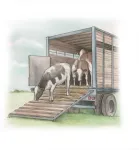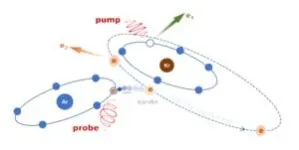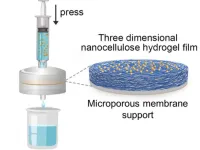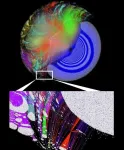(Press-News.org) A ‘fitness check’ of regulations in five countries meant to protect animals during transportation, has deemed that they all fall short of fully protecting animals during transport. Findings from this interdisciplinary work involving animal welfare scientists and a law lecturer which compared animal transport rules designed to protect the billions of livestock that are transported on lengthy journeys in Australia, Canada, New Zealand, EU (including UK) and US, highlights serious failures.
The study, published in Royal Society Open Science today [Wednesday 24 January], and involving researchers from the Universities of Bristol, Essex and British Columbia (Canada), is the first comprehensive fitness check of live animal transportation regulations in five English-speaking Western countries to assess whether the regulatory framework for a policy sector is fit for purpose.
Live animal transport, which affects most farm animals at some point during their lifetime, is a stressful experience whereby animals are often subjected to long transport times during which they are prevented from drinking, eating and resting. For example, in Canada some animals can be transported for 36 hours without feed, water and rest.
Researchers investigated four major risk factors associated with live animal transportation - fitness for transport, journey duration, climatic conditions and space allowances - and explored how regulations were structured to prevent animal welfare issues.
Results from this research showed that all countries could improve and draw key future directions for new policies. For instance, no countries adopt maximum journey duration for all animals, meaning that animals can sometimes be transported for days. Not all countries mandate regular rest stops for long journeys but those that do often mandate rest stop times that are too short to allow meaningful recovery. Updating the transport regulations using the most recent science would be an important step towards improved animal welfare during transport, bringing the livestock industries more in line with societal values.
The team also considered recent and proposed changes to the regulations. These included reviewed changes that have been announced but not yet been translated into legislation or different options that are being considered. For instance, last month (December 2023), a Bill including a ban on the export of livestock for slaughter and fattening from Great Britain (i.e., England, Scotland and Wales, but not Northern Ireland) was introduced in Parliament but may only target a minority of animals being exported.
Dr Ben Lecorps, study co-author and Animal Welfare Lecturer in the Bristol Veterinary School, said: “Our findings indicate that regulations are often insufficient or too vague to ensure they are fit for purpose. All studied countries fall short in guaranteeing adequate protection to livestock during transport. Whilst this does not mean that all animals transported will experience serious harms, major risk factors such as excessively long journeys, or journeys during hot weather, are not being addressed to a satisfactory level.”
Dr Eugénie Duval, study co-author and Lecturer in Law at the Essex Law School, added: “Even if they do not necessarily reflect the latest scientific evidence, some regulations are more specific than others. If we were to take the best from each regulatory framework (e.g. fitness for transport in Canada; providing species-specific thresholds for the temperature inside vehicles in the EU) and apply some of the propositions made by some countries (e.g. a ban of export outside the EU borders: proposition of some EU Member States), the ensuing regulations would be a major step closer to safeguarding animal welfare during transportation.”
The study was funded by a grant awarded to ED and MvK by the Humane Slaughter Association and the Hans Sigrist Research Prize awarded to MvK by the Hans Sigrist Stiftung Foundation.
END
Live animal transport regulations not ‘fit for purpose’, major international study finds
2024-01-24
ELSE PRESS RELEASES FROM THIS DATE:
Mind the (green) gap
2024-01-23
Color mixing is the process of combining two or more colors: red and green make yellow, blue and red make purple, red and green and blue make white. This process of mixing colors is the basis for the future of solid-state lighting. While currently white light is achieved by phosphor down-conversion, LED color mixing actually has a higher theoretical maximum efficiency, which is needed in order to achieve the 2035 DOE energy efficiency goals. Despite the potential efficiency of color-mixed LED sources, there exists one significant challenge: green. ...
Injectable water filtration system could improve access to clean drinking water around the world
2024-01-23
More than 2 billion people, approximately a quarter of the world’s population, lack access to clean drinking water. A new, portable and affordable water filtration solution created by researchers at The University of Texas at Austin aims to change that.
The new system collects dirty water with a syringe and injects it into a hydrogel filter that weeds out nearly all tiny particles. This device, the researchers say, offers significant advantages in cost, simplicity, effectiveness and sustainability compared existing commercial options, giving users the ability to easily decontaminate water from nearby streams and ...
Gravity helps show strong force strength in the proton
2024-01-23
The power of gravity is writ large across our visible universe. It can be seen in the lock step of moons as they circle planets; in wandering comets pulled off-course by massive stars; and in the swirl of gigantic galaxies. These awesome displays showcase gravity’s influence at the largest scales of matter. Now, nuclear physicists are discovering that gravity also has much to offer at matter’s smallest scales.
New research conducted by nuclear physicists at the U.S. Department of Energy’s Thomas Jefferson National Accelerator Facility is using a method that connects theories of gravitation to interactions among the smallest ...
Cleveland Clinic and IBM Researchers publish findings on artificial intelligence and immunity
2024-01-23
Researchers from Cleveland Clinic and IBM have published a strategy for identifying new targets for immunotherapy through artificial intelligence (AI). This is the first peer-reviewed publication from the two organizations’ Discovery Accelerator partnership, designed to advance research in healthcare and life sciences.
The team worked together to develop supervised and unsupervised AI to reveal the molecular characteristics of peptide antigens, small pieces of protein molecules immune cells use to recognize threats. Project members ...
When some adolescent girls internalize rejection, it really is in their head
2024-01-23
Everyone ruminates about the bad things that happen to them. Whether it’s a nasty breakup, an embarrassing failure or simply when someone is mean, it can be hard to stop thinking about what happened and why. For people who ruminate too much, this negative thought pattern can cause lasting problems with mental health.
A research team led from the University of California, Davis, Center for Mind and Brain found that adolescent girls who have a stronger tendency to ruminate show different patterns of brain activity when faced with social rejection. The study was ...
Researchers design new open-source technology for interfacing with living neurons
2024-01-23
Neurons intricately communicate and respond to stimuli within a vast network, orchestrating essential functions from basic bodily processes to complex thoughts. Traditional neuroscience methods, relying on in vivo electrophysiology (within a living organism), often have difficulty addressing the complexity of the brain as a whole. An alternative approach involves extracting cells from the organism and conducting studies on a culture dish instead (in vitro), providing researchers with enhanced control and precision in measuring neural processes. In a new study featured in Advanced Science, researchers unveil a cost-effective, open-source in vitro system ...
Why do young women with multiple sclerosis face health disparities?
2024-01-23
While recent therapies have the potential to stall or delay the progression of multiple sclerosis, a new study shows that young Black and Hispanic women fare worse than young white women.
Minority women were more likely to have more advanced disease and faced greater challenges in pregnancy, the researchers reported in their study, publishing in the journal Neurology on Jan. 23, 2024.
Researchers tracked medical records at nine MS centers throughout the country for 294 women whose pregnancies resulted in live births. Approximately half of the patients ...
Could two drugs be better than one for treating prostate cancer?
2024-01-23
Combining testosterone-blocking drugs in patients with prostate cancer relapse prevents the spread of cancer better than treatment with a single drug, a multi-institution, Phase 3 clinical trial led by UC San Francisco researchers has found.
The approach can extend the time between debilitating drug treatments without prolonging the time it takes to recover from each treatment.
Prostate cancer affects 1 in 8 men and causes 34,000 deaths each year in the United States. It is usually treated with one of several testosterone-lowering drugs for a set period of ...
Predicting and controlling bad-actor AI activity in a year of global elections
2024-01-23
MEDIA CONTACT:
Cate Douglass; cdouglass@gwu.edu
More than 50 countries are set to hold national elections this year and analysts have long sounded the alarm on the threat of bad actors using artificial intelligence (AI) to disseminate and amplify disinformation during the election season across the globe.
Now, a new study led by researchers at the George Washington University predicts that daily, bad-actor AI activity is going to escalate by mid-2024, increasing the threat that it could affect election results. The research, published today in the journal PNAS Nexus, is the first quantitative scientific ...
When lab-trained AI meets the real world, ‘mistakes can happen’
2024-01-23
First study to examine the impact of tissue contamination on AI models
‘If it’s paying attention to the tissue contaminants, it’s paying less attention to the patient’s tissue that is being examined’
‘Pathologists fear — and AI companies hope — that the computers are coming for our jobs. Not yet.’
Human pathologists are extensively trained to detect when tissue samples from one patient mistakenly end up on another patient’s microscope slides ...





